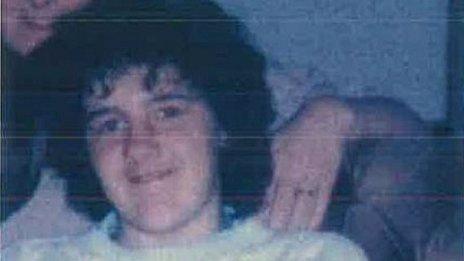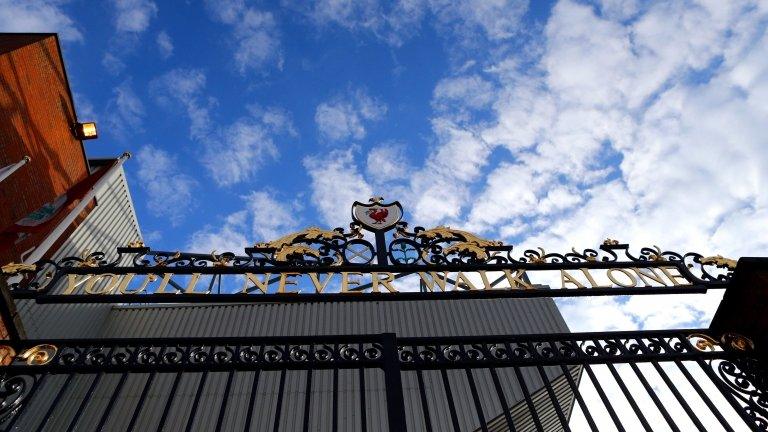Hillsborough stories: Marian Hazel McCabe
- Published

Marian Hazel McCabe was aged 21 when she died
Marian McCabe, 21, a Liverpool season ticket holder and factory worker from Basildon, Essex, travelled to Sheffield with friends by train from King's Cross station. They all survived, with the exception of Inger Shah, who also died.
This is the full statement to the inquests from her mother Christine McEvoy:

I am the mother of the late Marian Hazel McCabe, who was born on 13 February 1968.
As a baby, Marian was tiny, weighing only six pounds, and had a mop of dark hair, which she kept throughout her life.
Marian was approaching her fourth birthday when her younger brother Peter was born. She immediately became his second mother, looking after him for the 17 years that they shared together.
When they were teenagers, I bought them each a supply of yogurts a week. Peter got through his in no time, but Marian would still have hers at the end of the week, so she'd let her brother have one.
She always had a generous nature like that.
Marian liked to be close to her brother, and when he joined the running club, she joined too. She wasn't particularly sporty, but took up the field events.
But when Peter was old enough, she shared with him her greatest love: Liverpool Football Club.
Marian loved football from an early age, but it was only when she started working that she became a Liverpool season ticket holder and a member of the London branch of the supporters' club.
She initially went to matches alone, but then began meeting fellow fans on the journey up from London.
They would meet at Euston, travel up by train together. She spent most of her money on Liverpool, not only going to the games, but also buying caps, badges, shirts and posters, and whenever she could get Peter a ticket, she would take him along.
'Grandad's girl'
Marian loved Liverpool so much that she would work overtime throughout the summer to save for matches, and would use her days off to save for midweek games during the winter.
She even missed my lunchtime wedding because Liverpool were playing in London. But she arrived later for the reception, having washed and changed.
Whenever Marian went to see Liverpool play Arsenal, her grandad's team, she would bring him a match programme back.
She was always thinking of others, and she was always her grandad's girl.
After my mother died, Marian, Peter, my father and I all went to Butlins for a holiday.
While Peter was off playing football, Marian spent the week with her grandfather chatting away as they took the cable car around the holiday camp.
Marian was always joining groups and activities.
Before her days with the London branch of the supporters' club, she joined the Girls' Brigade, she travelled to Paris with her school and performed in plays annually.
As a young Sunday school student, she played the part of a Christmas tree impeccably!
The enthusiasm Marian demonstrated in joining clubs and activities also came through in her work.
She was a hard worker and had left school receiving training on a programme sponsored by Yardley Cosmetics.
After a year's training, she began working on the company's production line, where she continued to work until her death.
Despite being a hard worker, Marian was also very laid back.
When she was 16, she had surgery to break and reset her jaws. I asked her if she was sure she wanted the operation, and she replied, "Yeah, it'll be fine." Nothing ever fazed her.
After the operation, Peter and I visited her in intensive care. I didn't think that she would be able to talk, but through her teeth she managed to point out that she was the only person in the ward who had not received flowers. We quickly popped out and returned with flowers and a teddy bear.
When she came home from hospital, she had metal plates in her head and jaws - in fact, we called her Jaws, after the Bond villain.
'Good and generous'
She asked if she could go out and visit a friend, but I was terribly worried that she would trip and hurt herself on the metal plates. She said, "Mum, I'll be fine, and I've already been round to one friend anyway".
When the metal plates and mask were removed, the surgeon told Marian she could stick her tongue out at me as much as she liked, because sticking her tongue out was the best way to make her jaw flexible again.
He also told her to eat large pieces of food, so on the way home we stopped at the bakers and I treated her to a huge chocolate eclair.
I wish that I'd had a chance to treat my daughter more.
At the time of her death, she was thinking of travelling to Italy to follow England in the 1990 World Cup.
Her grandmother had left her some money, and I suggested to Marian that she should use it to go to the World Cup, treating herself, if that's what she wanted to do.
In the end, of course, she never got the chance.
In Peter's words, Marian was "a giver, not a taker". She would do whatever her little brother asked, and he wasn't exactly the nicest of teenagers!
She was such a good and generous person that no words will ever do her justice.
- Published3 April 2014

- Published26 April 2016

- Published31 March 2014
